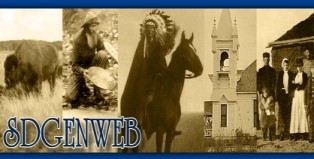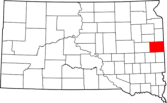|
Welcome to Brookings County SDGenWeb
|
I can give readers information on many of the individuals mentioned. Internal evidence indicates the letter was written in 1959, prior to June, on the 75th Anniversary of the founding of White, South Dakota, then Dakota Territory. What follows is a typed transcription of a handwritten transcription of the original letter. It has been checked against passages quoted in printed sources and found accurate. Dear Mrs. Jensen, I visited White and vicinity last August and cannot return at this time. My visit and your invitation have brought to mind most vividly the early days. My father, P. J. Hegeman, was one of the earliest settlers in "the valley" east of White. There was no "White" the spring of 1877. The nearest market was Canby Minnesota. Soon after my father arrived, came my grandparents P. J. Hegeman Sr., wife, daughter and son: John A. Hegeman, who later was one of the early surveyors of Brookings County. The other grandfather, Denton Dolson, and his brother M. Dolson, with their families all settled in "the Valley." A great uncle Washington Warren, bought "Warren's Woods," now I believe "Gilley's Grove." My sister and I regretted the change from the long used earlier name. I was born the December following the family's arrival. Distant relatives, the Palmers, settled in Sherman Township. All had originally moved from Gloversville, New York, to Sparta Wisconsin, then to Brookings County. The Palmers contributed much to the social life of those early days. They were all gifted with beautiful voices and several of that large family had married wives who also had lovely voices, tenors, basses, sopranos and contraltos -- they knew all our folk songs, negro spirituals, patriotic songs. The pioneers met in the first Sherman school house for spelling bees, song fests and necktie basket socials. The children would be bedded down on the school benches -- while the fun went on 'til midnight. Parties were held at the homes and one I especially recall, after my father had built his good house on the hill (our first was a log house in the valley). The friends assembled one winter night all bringing food for the midnight supper. The robes were brought in and the children put down like sardines on the floor of a bedroom -- the women took turns resting on the beds. The Palmers sang the night through -- their repertoire was inexhaustible. The Boydens took land in what was known as Oaklake Township, I think. During the most terrible blizzard (I think in 1880) the father was away. Frank and his mother burned hay, the furniture, the floor, and finally were forced to seek a neighbor, Mr. Andrews. Mrs. Boyden could not reach their house, sinking down in the snow with her tiny son, Lon. Frank followed a furrow and reached the house. He and Mr. Andrews found Mrs. Boyden. All might have been lost, as many were, in that record storm. A school was established in "The Valley" and the winter of '79 Frank stayed with my people and went to school. He was nine and a half, I was not two years old. My mother was the most competent woman I've ever known. She made cheese, processed pigs and beef, cleaned the wool, spun it, knitted all our stockings, made all our clothes. I recall the visits of Sioux Indians. They'd bring bright calicos to trade for vegetables from the wonderful garden my father always had, for butter, bread, etc. when winter came there'd be barrels of salted green beans, salted cucumbers, crocks of sour kraut corned beef, salt pork, smoked hams. Always there was ice packed in straw for the hot summers; and always lovely great milk pans with cream rising in our cool milk room. I recall, too, the fear of the prairie fires. My father had planted his "tree claim" as required, and several times the clan gathered to fight the raging grass fires that leaped over the land. My grandmother Dolson, living on the route from Canby to Marshall, Minnesota, furnished dinners and lodgings for those seeking homes farther inland. All are gone who ate at her table but I recall statements from many who acclaimed her home as a haven of rest after their difficult trek to that primitive land. The Hegemans were not farmers, and soon my father was making gloves, mittens, robes and coats of buffalo and sheep skins for men. That art they knew well for it was the family's business originally in Gloversville, New York. He established a little shop in White. I graduated from High School under Mr. Norman in 1893 and that fall the family moved to Brookings -- a better place for my father's business, and for the children, a chance for a college education. Beginning with my thirteenth year, I played the organ in the Presbyterian church under the direction of the Palmers. For a time Mr. Haurer was our beloved pastor. And in 1893, a graduate of the High School, Mr. C. E. West, inveighed me into securing a certificate and placed me in the Minier School. I boarded with the Pete Bentsens, whose sons, I understand , are prominent citizens of Texas. I walked to school through that winter -- most of the road unraveled -- deep with snow and built the fire in the pot-bellied stove. I was not yet sixteen but the life was not as difficult as it might have been. Mr. John Allison or some of the Palmers came for me Friday nights so that I might play for services Sundays. There were many loved friends in White. The Palmers, Allisons, Whites, Duggers, some of whom I have known in the West. Last summer I was happy to visit with Kitte White Henry and Mr. Minier in the Post Office. On trips to California we visited Whites family, Flora Meyer Doughty, Horton, Palmer and his wife Hattie Meyer -- also during earlier year many White families located in Santa Ana. Brookings meant college, my marriage to Frank Boyden, our years in Chicago while he studied Medicine, and I studied music -- his internship at the Mayos -- a few years back in Brookings, and then the move to Oregon with our two little boys. Because of disability Frank retired in 1945. He needed the sun so we would close our lovely home at Mt. Hood, going for nine winters to Mexico. He died in January of 1957. Soon he would have been eighty-seven. During our Oregon days Frank visited clinics in Europe and in 1938 I had eight months in that storied land. After Frank's death I went abroad again for a full year of travel with a car. On my return last August my sister Mable Hegeman Allison traveled with me from New York to the west visiting Brookings en route. I found none I knew in White -- Ralph Holden was not home. But we had a fine visit with the Dignes in Hendricks. There were many heartaches -- the Habers were gone and so many in Brookings that we had known and loved. Ten of my family lie in the Brookings cemetery -- five are buried in Portland, including our older son, Dr. Horace Boyden. Last year Dr. Guy Boyden, Frank's youngest brother died. Life has been kind to us in many ways -- our son Dr. Allen Boyden, wife and their three sons are near me -- so I'm not alone. But approaching 82, most of my friends are gone. I have written at length for I suspect there are few surviving who arrived as early as my father's group and who recall those early days seven years before White was established. I could recount many of the humorous incidents told through the years -- one that Frank often told will have to suffice. When supplies had to be bought, the fathers would travel to Canby Minnesota until Brookings was established. One day grandfather Boyden left for Brookings with his ox team. Grandmother warned again and again that he should not forget lamp chimneys. Grandfather remembered and was fascinated by the new "unbreakable glass" chimneys. The merchant threw one on the counter to demonstrate. Grandfather bought two. When he returned, the first question was -- "Did you remember the chimneys?" In reply grandfather tossed them to her -- they fell to the floor and shattered. No explanation about "non-shatterable glass" made any sense to this angry woman. It simply meant to her no light in the house for perhaps another two months. The present generation has no conception of the privations and hardships of the earliest days. The wives were doctors, religious instructors, teachers, conservers of every tiny ounce that could contribute to the well-being of the family. Soon the men had gardens, chickens, cows, sheep, pigs. Hospitality was general and I recall no time after those first most difficult months that the tables were not bountifully spread for any wayfarers who traveled the trail which passed our doors. Am sorry this communication is so long but I'm afraid you asked for it. Greet any old friends who visit White in June -- for the Hegemans and the Boydens. Only my sister and I are left who recall the early days. There are no Boydens of that generation. However the later generations are happy to know of their heritage. Kindly send me any publications relative to those early days. I would like to know if there are any survivors who come to White region as early as my arrival in 1877. Mrs. F. E. Boyden [Maude Eva Hegeman m. Frank Edson Boyden] |


